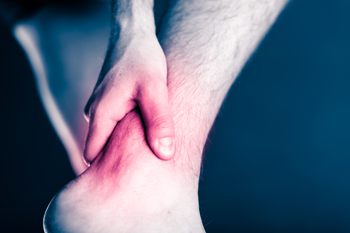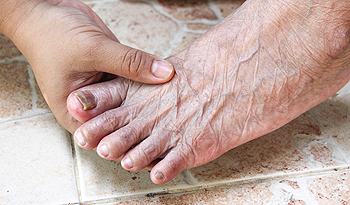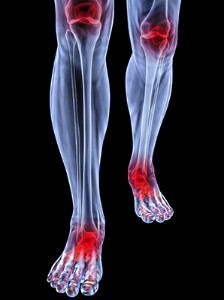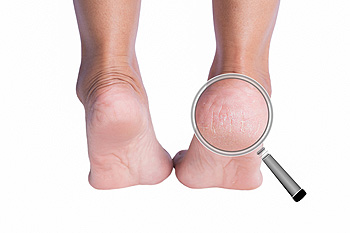September 2018
Is An Achilles Tendon Injury Painful?
 The tendon that links the calf muscles to the heel bone is referred to as the Achilles tendon or the calcaneal tendon. It is known to be the largest tendon in the body and allows activities such as pointing and flexing to be possible. This function is necessary to walk, run, and jump, and if the Achilles tendon should endure a tear, these activities would be difficult to accomplish. There are several reasons why this particular tendon may become injured, including pushing off suddenly while beginning to run, overcompensation the tendon may undergo if a fall should occur, or suddenly stepping off of a curb. The symptoms that are associated with this condition typically include severe pain and discomfort in the back of the heel, an inability to stand on the tiptoes in addition to not being able to point and flex the toes. If you have endured an injury and you feel the Achilles tendon is torn, please speak with a podiatrist as quickly as possible so the correct treatment can begin.
The tendon that links the calf muscles to the heel bone is referred to as the Achilles tendon or the calcaneal tendon. It is known to be the largest tendon in the body and allows activities such as pointing and flexing to be possible. This function is necessary to walk, run, and jump, and if the Achilles tendon should endure a tear, these activities would be difficult to accomplish. There are several reasons why this particular tendon may become injured, including pushing off suddenly while beginning to run, overcompensation the tendon may undergo if a fall should occur, or suddenly stepping off of a curb. The symptoms that are associated with this condition typically include severe pain and discomfort in the back of the heel, an inability to stand on the tiptoes in addition to not being able to point and flex the toes. If you have endured an injury and you feel the Achilles tendon is torn, please speak with a podiatrist as quickly as possible so the correct treatment can begin.
Achilles tendon injuries need immediate attention to avoid future complications. If you have any concerns, contact one of our podiatrists of Piedmont Foot & Ankle Clinic. Our doctors can provide the care you need to keep you pain-free and on your feet.
What Is the Achilles Tendon?
The Achilles tendon is a tendon that connects the lower leg muscles and calf to the heel of the foot. It is the strongest tendon in the human body and is essential for making movement possible. Because this tendon is such an integral part of the body, any injuries to it can create immense difficulties and should immediately be presented to a doctor.
What Are the Symptoms of an Achilles Tendon Injury?
There are various types of injuries that can affect the Achilles tendon. The two most common injuries are Achilles tendinitis and ruptures of the tendon.
Achilles Tendinitis Symptoms
- Inflammation
- Dull to severe pain
- Increased blood flow to the tendon
- Thickening of the tendon
Rupture Symptoms
- Extreme pain and swelling in the foot
- Total immobility
Treatment and Prevention
Achilles tendon injuries are diagnosed by a thorough physical evaluation, which can include an MRI. Treatment involves rest, physical therapy, and in some cases, surgery. However, various preventative measures can be taken to avoid these injuries, such as:
- Thorough stretching of the tendon before and after exercise
- Strengthening exercises like calf raises, squats, leg curls, leg extensions, leg raises, lunges, and leg presses
If you have any questions please feel free to contact one of our offices located in Cary, Apex, Dunn, and Benson, NC . We offer the newest diagnostic tools and technology to treat your foot and ankle needs.
Read more about What are Achilles Tendon InjuriesSymptoms of Toenail Fungus
 A condition that is referred to as onychomycosis is commonly known as a fungal infection of the toenails. It is common among people who have sweaty feet or enjoy spending time swimming. It may occur as a result of the small fungi seeping through tiny cuts in the skin, or possibly lodging between the nail and the nail bed. It may be common to find this type of infection in the toenails because of the warm environment the shoes and socks provide. There are several symptoms associated with this condition, including having a yellow, white or brown appearance, the nail becoming brittle and breaking easily, or the nail becomes uncomfortable. Despite the unsightly appearance, they typically do not pose a health threat unless the patient is diabetic. Research has shown there may be preventative measures that can be taken, including washing and drying the feet, especially between the toes, trimming the nails properly and frequently, and avoiding wearing other people’s shoes. If you feel you have a toenail fungus, it’s suggested to speak with a podiatrist as quickly as possible for a correct diagnosis and to learn about treatment options.
A condition that is referred to as onychomycosis is commonly known as a fungal infection of the toenails. It is common among people who have sweaty feet or enjoy spending time swimming. It may occur as a result of the small fungi seeping through tiny cuts in the skin, or possibly lodging between the nail and the nail bed. It may be common to find this type of infection in the toenails because of the warm environment the shoes and socks provide. There are several symptoms associated with this condition, including having a yellow, white or brown appearance, the nail becoming brittle and breaking easily, or the nail becomes uncomfortable. Despite the unsightly appearance, they typically do not pose a health threat unless the patient is diabetic. Research has shown there may be preventative measures that can be taken, including washing and drying the feet, especially between the toes, trimming the nails properly and frequently, and avoiding wearing other people’s shoes. If you feel you have a toenail fungus, it’s suggested to speak with a podiatrist as quickly as possible for a correct diagnosis and to learn about treatment options.
For more information about treatment, contact one of our podiatrists of Piedmont Foot & Ankle Clinic. Our doctors can provide the care you need to keep you pain-free and on your feet.
Toenail Fungus Treatment
Toenail fungus is a condition that affects many people and can be especially hard to get rid of. Fortunately, there are several methods to go about treating and avoiding it.
Antifungals & Deterrence
Oral antifungal medicine has been shown to be effective in many cases. It is important to consult with a podiatrist to determine the proper regiment for you, or potentially explore other options.
Applying foot powder on the feet and shoes helps keep the feet free of moisture and sweat.
Sandals or open toed shoes – Wearing these will allow air movement and help keep feet dry. They also expose your feet to light, which fungus cannot tolerate. Socks with moisture wicking material also help as well.
If you have any questions please feel free to contact one of our offices located in Cary, Apex, Dunn, and Benson, NC . We offer the newest diagnostic tools and technology to treat your foot and ankle needs.
Read more about Toenail FungusFoot Conditions That May Occur as a Result of Rheumatoid Arthritis
 If you are afflicted with rheumatoid arthritis, you may develop foot conditions that may be associated with this ailment. There are several symptoms that may be connected with this condition, including discomfort and soreness in the feet, instability involving the joints of the toes, the front of the foot, and swelling. Fluid filled sacs, which is referred to as bursae, may develop as a result of the inflammation that occurs. This is due to extreme rubbing, especially on the sole of the foot. Corns, calluses and blisters may be side effects of this painful condition, in addition to circulatory problems concerning the feet. If you feel you are in the process of developing rheumatoid arthritis, it’s strongly suggested to speak with a podiatrist who can offer proper treatment options for this ailment.
If you are afflicted with rheumatoid arthritis, you may develop foot conditions that may be associated with this ailment. There are several symptoms that may be connected with this condition, including discomfort and soreness in the feet, instability involving the joints of the toes, the front of the foot, and swelling. Fluid filled sacs, which is referred to as bursae, may develop as a result of the inflammation that occurs. This is due to extreme rubbing, especially on the sole of the foot. Corns, calluses and blisters may be side effects of this painful condition, in addition to circulatory problems concerning the feet. If you feel you are in the process of developing rheumatoid arthritis, it’s strongly suggested to speak with a podiatrist who can offer proper treatment options for this ailment.
Because RA affects more than just your joints, including the joints in your feet and ankles, it is important to seek early diagnosis from your podiatrist if you feel like the pain in your feet might be caused by RA. For more information, contact one of our podiatrists of Piedmont Foot & Ankle Clinic. Our doctors will assist you with all of your podiatric concerns.
What Is Rheumatoid Arthritis?
Rheumatoid Arthritis (RA) is an autoimmune disorder in which the body’s own immune system attacks the membranes surrounding the joints. Inflammation of the lining and eventually the destruction of the joint’s cartilage and bone occur, causing severe pain and immobility.
Rheumatoid Arthritis of the Feet
Although RA usually attacks multiple bones and joints throughout the entire body, almost 90 percent of cases result in pain in the foot or ankle area.
Symptoms
- Swelling and pain in the feet
- Stiffness in the feet
- Pain on the ball or sole of feet
- Joint shift and deformation
Diagnosis
Quick diagnosis of RA in the feet is important so that the podiatrist can treat the area effectively. Your doctor will ask you about your medical history, occupation, and lifestyle to determine the origin of the condition. Rheumatoid Factor tests help to determine if someone is affected by the disease.
If you have any questions please feel free to contact one of our offices located in Cary, Apex, Dunn, and Benson, NC . We offer the newest diagnostic and treatment technologies for all your foot and ankle needs.
Read more about Rheumatoid Arthritis in the FeetCauses of Cracked Heels
 If standing for long periods of time is part of your daily routine, you may experience a condition that is referred to as cracked heels. The skin on the heels may become thick and can produce cracks or fissures, which may often be unsightly and uncomfortable. There are some people who may be prone to developing cracked heels, including those who are overweight in addition to people who frequently wear shoes that have an open back. Cracked heels is known as a foot condition that will worsen gradually if left untreated and may lead to serious foot conditions including cellulitis. If you have developed cracked heels, it’s important to wash and dry the feet thoroughly followed by utilizing a good moisturizer daily, which will not only feel good but may aid in healing the fissures. If your heels are severely cracked, it’s suggested to speak with a podiatrist as quickly as possible who may perform specific procedures that can effectively treat this condition.
If standing for long periods of time is part of your daily routine, you may experience a condition that is referred to as cracked heels. The skin on the heels may become thick and can produce cracks or fissures, which may often be unsightly and uncomfortable. There are some people who may be prone to developing cracked heels, including those who are overweight in addition to people who frequently wear shoes that have an open back. Cracked heels is known as a foot condition that will worsen gradually if left untreated and may lead to serious foot conditions including cellulitis. If you have developed cracked heels, it’s important to wash and dry the feet thoroughly followed by utilizing a good moisturizer daily, which will not only feel good but may aid in healing the fissures. If your heels are severely cracked, it’s suggested to speak with a podiatrist as quickly as possible who may perform specific procedures that can effectively treat this condition.
Cracked heels are unsightly and can cause further damage to your shoes and feet. If you have any concerns, contact one of our podiatrists from Piedmont Foot & Ankle Clinic. Our doctors can provide the care you need to keep you pain-free and on your feet.
Cracked Heels
Cracked heels appear unappealing and can make it harder for you walk around in sandals. Aside from looking unpleasant, cracked heels can also tear stockings, socks, and wear out your shoes. There are several methods to help restore a cracked heel and prevent further damage.
How Do You Get Them?
Dry skin is the number one culprit in creating cracked heels. Many athletes, walkers, joggers, and even swimmers suffer from cracked heels. Age and skin oil production play a role to getting cracked heels as well.
Promote Healing
Over the counter medicines can help, especially for those that need instant relief or who suffer from chronic dry feet.
Wear Socks – Wearing socks with medicated creams helps lock in moisture.
Moisturizers – Applying both day and night will help alleviate dryness which causes cracking.
Pumice Stones – These exfoliate and remove dead skin, which allows for smoother moisturizer application and better absorption into the skin.
Change in Diet
Eating healthy with a well-balanced diet will give the skin a fresh and radiant look. Your body responds to the kinds of food you ingest. Omega-3 fatty acids and zinc supplements can also revitalize skin tissue.
Most importantly, seek professional help if unsure how to proceed in treating cracked heels. A podiatrist will help you with any questions or information needed.
If you have any questions, please feel free to contact one of our offices located in Cary, Apex, Dunn, and Benson, NC . We offer the newest diagnostic and treatment technologies for all your foot care needs.
Read more about Solutions for Cracked Heels



